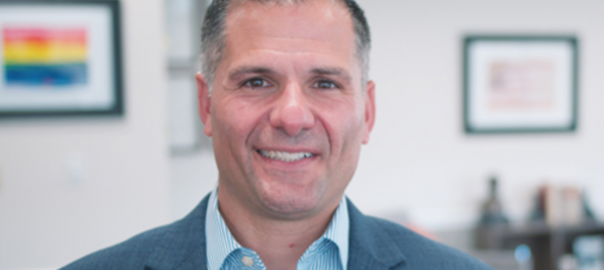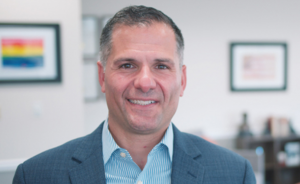
Arrival of COVID Brings Personal Tragedy

An Excerpt from Chapter 1 of Our Darkest Hours: New York County Leadership and the COVID Pandemic
“Dad’s sick,” my sister said.
Her phone call had come out of the blue. Since January 2020, I’d followed the news about COVID-19 as the virus swept across China and Europe. I realized it was a problem, but I believed—hoped is probably a better word—that there was a chance it wouldn’t reach the United States. Yet even if the virus landed here, I had no idea how rapidly it would afflict us—at least not until cases began popping up in New York City. Simply going about my daily routine, saying hello to people on the street or at the office, I sensed how frightened everyone was becoming. A couple of weeks after New Year’s Day, we started organizing our pandemic-response team and bracing for our first case. On a Sunday morning in March, we received a call from Ulster County Executive Patrick Ryan. Pat said that his county’s first case had come from a facility in Dutchess. COVID-19 had arrived.
And there I was, shortly afterward, listening to my sister recount our father’s ordeal. Only days before, he had been fine. His symptoms developed slowly. He noticed that he was feeling sick, and then, suddenly, he collapsed. My conversation with my sister sounded as if a county executive was discussing the problem with a resident. However, as we spoke, the pandemic became personal to me, and it was hard to stop thinking about all of the families losing loved ones.
I did what I could for my father, contacting Westchester Medical Center and arranging for him to be admitted. I got a chance to speak with him for ten minutes before he went into the hospital. That was a blessing. I didn’t know my father well. My parents divorced when I was young, and we had drifted apart. He started another family, and we didn’t communicate again until the last several years, and even that contact had been limited to occasional texts or phone calls around the holidays. I had missed so much time with him. He never really got to know my wife and children, and the rare occasions we were together fishing or watching the Mets or singing Billy Joel songs became precious to me when I concluded that he might not leave the hospital, and this would be my last opportunity to make peace with our relationship.
My father went downhill at a terrifying speed. The doctors decided to put him on a ventilator, and it wasn’t long before they informed me that it wouldn’t be safe to take him off. Those two weeks remain a blur to me. I remember praying every day that I’d get five more minutes with my dad.
On April 9, a Friday, at 1:59 p.m., a nurse texted me to say that she thought my father didn’t have much time left and asked if I wanted to call him.
I thought how strange it was, in this circumstance, not to be there in person, but I was anxious to speak with him.
The nurse held the phone to his ear. I told my father that I loved him and I wished we’d been able to talk about so many things. I promised that I’d stay close to my sisters, and that he should know that, despite the problems of years gone by, he was loved.
My father, Anthony Molinaro, died at 2:04. I am grateful that I got my five minutes.
….
As shocking as the human cost of the pandemic was to me, I watched with mounting horror as businesses began to close, and I’m not talking only about money here. Long-standing community gathering places shut down and may never open again. Business owners and their employees, most of whom work hard to make ends meet, were left without an income and without knowing whether that situation would ever change. Savings and unemployment—even with federal help—won’t last forever.
Fortunately, if there is one thing a county executive knows how to do, it is how to cope with the ins and outs of worrying about money. It’s baked into the job description. What is necessary in our budget? How will taxes affect the community? Who will push for more spending? Who will argue for less? How many sleepless nights are in my future?
I knew that we were going to spend lots of money and weren’t going to bring in enough to cover our costs. Now wasn’t the time to worry about budgets. We would spend what was necessary. Building test sites and organizing transportation for those in need—to get food or go to the hospital or the test sites—wasn’t going to be cheap. We had to think about whether the test sites would be in tents, heated or air-conditioned, and spaced for social distancing. We had to think about whether we had sufficient body bags and refrigerated cars for the rising death rate. Some areas were closing their homeless shelters; we expanded ours and opened up an additional temporary shelter. We took a vacant facility on the sheriff’s office campus, creating temporary housing units with showers, medical capacity, beds, and recreational space. We let anyone who needed shelter come in. The risk was that we didn’t know if somebody was going to walk in sick and spread the virus.
There have been other communities that haven’t focused on the most vulnerable population—the homeless, the mentally ill, or those with other disabilities. That was their decision, and I don’t criticize them. We took action quickly to ensure we were communicating with individuals with special needs. We coordinated with service providers via our rapid response team with regular weekly calls and directed personal protective equipment to help them, even when the state told us not to. That was tough. There were times when the state said that PPE must go to here, but not there, and we disagreed. We met our needs. Mental health went to the top of our list. Telemedicine, telepsychology, and teletherapy all became critical.
I think we made the right choices and reacted as well as one could expect. Gradually, though, I could feel the mounting financial pressure.
The loss of sales tax was going to be a disaster. As far as we knew when the year started, assessed valuation was going to be stable for 2020. We were going to get our property taxes. But the one thing we had no control over was the loss of the sales tax revenue. We were prepared for the worst. We estimated it could be as bad as a $75 million loss, and we did a little better, but this is still financially untenable. You don’t have the luxury in government to back out of commitments. There are services we are legally required to provide, and the shortfall of revenue made it difficult to do this. Add that to the uncertainty of federal and state assistance, we are in the dark and still weathering that storm.
From the start, my biggest concern was the unknown. Would the cases continue to rise? Would we have to open more facilities? We were prepared to use Dutchess Community College as an auxiliary medical center. We were preparing it and asking ourselves if we’d have sufficient room. Or would we be fighting other counties for space?
We want to help everybody, but we also need to provide the resources and services to our own folks. Will the state demand that we move resources out of Dutchess and give it to other people? Will they force other patients to relocate into this community? All of that became so challenging and, at times, adversarial. That worried us every day. We never knew what Governor Andrew Cuomo would order us to do.
New York State decentralizes its public-health response, so in a pandemic, counties effectuate the policy. The governor can have a press conference and issue executive orders and order the State Health Department to do certain things, but it doesn’t get done unless the counties do it. There is no flattening the curve or pandemic response without county governments, and there will be no rebuilding of our economy or overcoming any challenges of the pandemic without us. There are nineteen hundred public health departments administered by counties across the United States, but none of them function the way we do in New York. We succeed by having county-to-county relationships that encourage the act of picking up the phone and learning from others by listening and sharing information.
We have leaned on one another. It has defined our success, but it also has meant that in the face of loss, we had each other as local officials. The fact that Ulster County had a new county executive who came to office with professional and military experience made his perspective invaluable to somebody like me. In turn, my twenty-five years of working in government was invaluable to him.
Learn more here: https://www.nysac.org/ourdarkesthours
